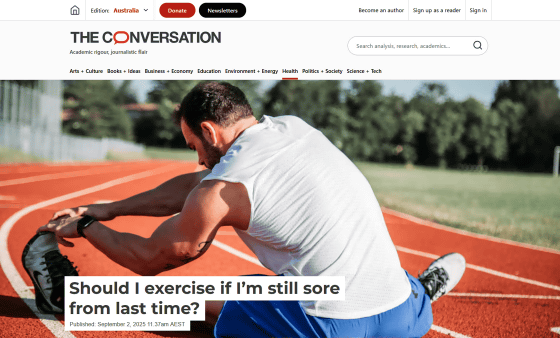Is it okay to exercise even if I still have muscle pain?

After running, working out at the gym, or playing sports, you may experience muscle pain in the areas you worked hard on. Usually, muscle pain subsides completely within three to five days, but
Should I exercise if I'm still sore from last time?
https://theconversation.com/should-i-exercise-if-im-still-sore-from-last-time-263046

Muscle soreness occurs because exercise causes tiny tears in the muscle, which then triggers inflammation as your body pumps in fluids and nutrients to repair the area—part of your body's normal recovery process, ultimately promoting gains in strength and muscle mass.
However, inflammation stimulates pain receptors, meaning you'll feel sore for a few days after exercise. The level of muscle soreness varies depending on the type and amount of exercise you do, and is more likely to occur if you haven't exercised in a while, try a new type of exercise, or do something that puts a lot of strain on your muscles, like weight training or running. Meanwhile, the more frequently you do the same type of exercise, the less likely you'll experience muscle soreness, Bennett explains.
While muscle soreness is normal, especially for beginners, it doesn't necessarily mean the exercise was effective. It simply means your body is adapting to a new type of exercise or a sudden increase in stress.
So, if you exercise consistently and gradually increase the frequency and intensity of your workouts, you may not experience much muscle soreness, even though your strength and muscle mass are gradually increasing. For example, someone who runs regularly is unlikely to experience muscle soreness after a single run, but their strength will still improve. Similarly, someone who regularly weight trains may only experience mild muscle soreness when using heavier weights than usual, but their strength and muscle mass will still increase, Bennett said.

As for the impact of muscle soreness on subsequent exercise, Bennett says, 'It depends on whether you're worried about injury or performance.'
In short, while there's no harm in exercising while your muscles are recovering,
Some research also suggests that muscle damage can negatively affect balance, which increases the risk of injuries like falls and ankle sprains. Additionally, some research suggests that muscle soreness can negatively impact skill performance, such as basketball shooting accuracy. Therefore, if you're trying to avoid injury or achieve specific performance goals, it may be best to avoid exercise while sore.
While it's common advice to take rest days between workouts to allow time for recovery, this doesn't have much of an effect on long-term gains in muscle strength or fitness. In a study in which two groups completed the same full-body weight training program for seven weeks, either on three consecutive days (e.g., Monday, Tuesday, and Wednesday) or three non-consecutive days (e.g., Monday , Wednesday, and Friday), both groups showed similar improvements in strength and muscle mass.
In another study , trained cyclists were asked to complete the same high-intensity interval training for three consecutive days or three non-consecutive days over a three-week period, and both groups showed similar improvements in aerobic fitness and time trial performance.

Bennett concludes, 'Exercising with sore muscles may make you slower and stiffer, but it won't harm your body or hinder your progress. However, you should avoid exercises that require balance, such as high jumps and landings, as there may be a slightly increased risk of injury.'
Additionally, massage and cold baths are methods of recovering from muscle pain that have evidence, although their effectiveness is small.
Bennett also points out that it's important to listen to your body, as any severe pain or discomfort could be a sign of injury, and advises consulting a doctor if:
Severe muscle pain lasting for more than 7 days.
- There is a bruise-like bruise on the muscle in the area where the muscle pain is.
I feel a sharp pain.
Related Posts:
in Free Member, Science, Posted by log1h_ik







